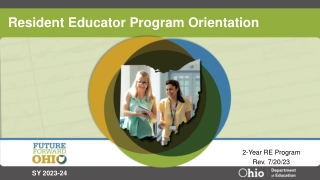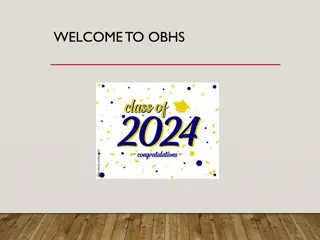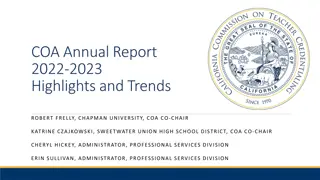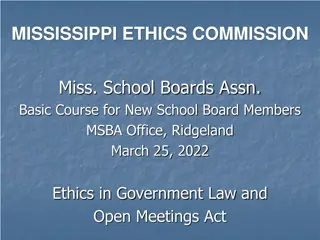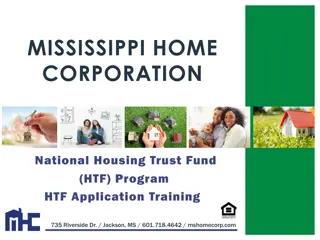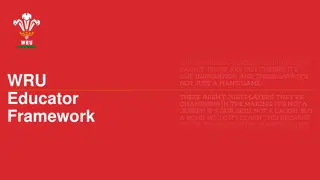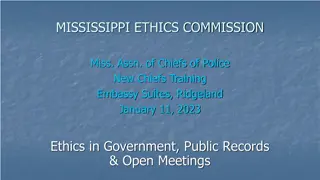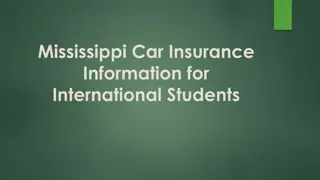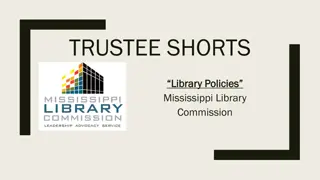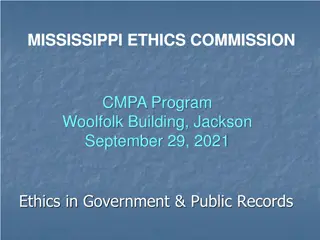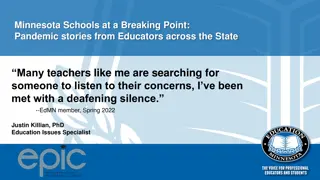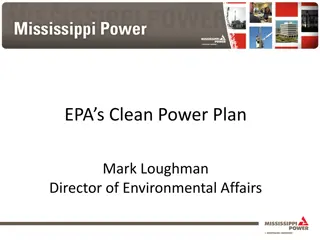Mississippi Educator Code of Ethics and Training Overview
The Mississippi Educator Code of Ethics aims to promote the health, safety, welfare, discipline, and morals of students and educators. Ethical training plays a crucial role in preparing administrators and teachers to make professional decisions. Violations of the code can be reported to the Mississippi Department of Education. Training sessions provide examples of ethical violations with fictional scenarios to educate educators on the consequences of poor choices.
Download Presentation

Please find below an Image/Link to download the presentation.
The content on the website is provided AS IS for your information and personal use only. It may not be sold, licensed, or shared on other websites without obtaining consent from the author. Download presentation by click this link. If you encounter any issues during the download, it is possible that the publisher has removed the file from their server.
E N D
Presentation Transcript
Mississippi Educator Code of Ethics EDUCATOR AND PRE-SERVICE TRAINING Office of Teaching and Leading Divisions of Educator Preparation, Educator Licensure, and Educator Effectiveness
Purpose for Code of Ethics To promote students and educators : Health Safety Welfare Discipline and morals 2
Purpose for Training To ensure administrators and teachers are prepared to make professional decisions, this training: "Ethics training is an important part of the Provides educators with a case study on poor ethical choices Displays extreme behaviors that are not tolerated by educational professionals "Ethics training is an important part of the process of educating administrators and teachers to ensure they are adequately prepared to make professional decisions" (Beck & Murphy; Hutchings, as cited in Davenport, Thompson, & Templeton, 2015). 3
Reporting of Code Violations Mississippi Department of Education 359 North West Street Jackson, MS 39201 Office of Educator Misconduct 601-359-2742 Main number www.mde.k12.ms.us 4
Training Overview Provides examples of violations of each Standard Uses characters, locations and situations that are purely fictional. Shows the progression and development of the violation and the consequences of making poor choices Includes scenarios and questions after the discussion of each standard. 5
Standard 1 Professional Conduct An educator should demonstrate conduct that follows generally recognized professional standards. 6
Standard 1: Professional Conduct Overview Professional educator responsibilities include: a) Exemplifying high standards b) Abstaining from discrimination c) Collaborating with other professionals d) Maintaining positive relationships with colleagues Since educators hold important positions requiring a high level of public trust and responsibility in working with children, educators are expected to observe high standards of moral and ethical conduct (Umpstead, Brady, Lugg, Klinker, & Thompson, 2013, p. 184). 7
Standard 1: Professional Conduct- Ethical Conduct 1.1. Ethical conduct includes, but is not limited to, the following: a) Maintaining high standards b) Respecting fellow educators c) Learning collaboratively to promote student learning d) Providing professional education services in a nondiscriminatory manner e) Maintaining competence f) Maintaining a professional relationship with parents 8
Standard 1: Professional Conduct- Unethical Conduct 1.2. Unethical conduct includes, but is not limited to, the following: a) Harassment of colleagues b) Misuse or mismanagement of tests or test materials c) Inappropriate language d) Physical altercations e) Failure to provide appropriate student supervision 9
Standard 1: Professional Conduct- Ethical Conduct Scenario 1: Mrs. Dixon has been teaching 6thgrade English for several years and is very active in the community and her local church. Recently, a student from another country moved to the area and was placed in her class. Mrs. Dixon disapproves of the student s religious practices. She places him in the back of the classroom and often isolates him. She never calls on him during instruction nor does she provide additional learning opportunities. Which of the Standard 1 ethical conduct examples does Mrs. Dixon s behavior violate? a) b) c) d) Respecting fellow educators and participating in the development of a professional teaching environment Engaging in a variety of individual and collaborative learning experiences to promote student learning Providing professional education services in a nondiscriminatory manner Maintaining competence regarding skills, knowledge, and dispositions relating to his/her organizational position, subject matter and pedagogical practices 10
Standard 1: Professional Conduct- Unethical Conduct Assessment Q1: Mr. Jackson has taught 8thgrade math for 10 years at Eastover Middle School. For the first 7 years, he had the highest scores in 8thgrade math on the state assessment. He has been concerned about declining scores for the last 3 years and wants to see exactly what types of questions students see on the state assessment. While proctoring the state assessment, he snaps a few pictures of a student s screen while she is taking the 8thgrade math assessment. Mr. Jackson s behavior describes which component of Standard 1 Unethical Conduct? a) b) c) d) Harassment of colleagues Misuse or mismanagement of tests or test materials Inappropriate language on school grounds or any school-related activity Physical altercations 11
Standard 1: Professional Conduct- Unethical Conduct Assessment Q2: Coach Richard has been the football coach at Highland High School for years. His team won the state championship last year. Coach Richard believes his success is attributed to the hard work and coaching tactics he learned from his former coach. The principal visits one of Coach Richard s practices and overhears him using profanity excessively toward the coaching staff and students. Coach Richard s behavior describes which component of Standard 1 Unethical Conduct? a) b) c) d) Harassment of colleagues Misuse or mismanagement of tests or test materials Inappropriate language on school grounds or any school-related activity Failure to provide appropriate supervision of students and reasonable disciplinary actions. 12
Standard 1: Professional Conduct- Unethical Conduct Assessment Q3: Mrs. Johnson is a first year 4thgrade teacher at Greene Elementary School. The copy machine was being used by another teacher after school yesterday, which prevented her from making copies for the unit assessment. It s 8 AM, and her students are entering the room. Mrs. Johnson runs to the teacher s lounge to make copies. The principal passes Mrs. Johnson s room and notices the students in the room alone. Mrs. Johnson s behavior describes which component of Standard 1 Unethical Conduct? a) b) c) d) Harassment of colleagues Misuse or mismanagement of tests or test materials Inappropriate language on school grounds or any school-related activity Failure to provide appropriate supervision of students and reasonable disciplinary actions. 13
Standard 2 Trustworthiness An educator should exemplify honesty and integrity in the course of professional practice. 14
Standard 2: Trustworthiness Overview Educators should be honest in all of his/her actions, including but not limited to: Providing truthful information concerning credentials, background information, employment, etc. Evaluating students or personnel Providing leave time, reasons for job absences, and educational content matter Participating in any type of investigation 15
Standard 2: Trustworthiness- Ethical Conduct 2.1. Ethical conduct includes, but is not limited to, the following: a) Properly representing facts concerning an educational matter b) Advocating for fair and equitable opportunities for all children c) Embodying for students the characteristics of honesty, diplomacy, tact, and fairness. 16
Standard 2: Trustworthiness- Unethical Conduct 2.2. Unethical conduct includes, but is not limited to, the following: a. Falsifying, misrepresenting, omitting, or erroneously reporting any of the following: 1) employment history, professional qualifications, criminal history, certification/recertification 2) information submitted to local, state, federal, and/or other governmental agencies 3) information regarding the evaluation of students and/or personnel 4) reasons for absences or leave 5) information submitted in the course of an official inquiry or investigation b. Falsifying records or directing or coercing others to do so 17
Standard 2: Trustworthiness- Ethical Conduct Scenario 2: Brently Middle School holds an annual reading contest. The homeroom class that reads the most books receives a free field trip to the Mississippi Children s and Natural Science Museums. After a student reads a book, he/she completes a book report and turns it in to the homeroom teacher. Each teacher turns in the book reports to the librarian for tallying and determining the winner. With hopes her class will win, Mrs. Creedmore tells her students they really don t have to read the books. She instructs them to copy the book cover summary and submit it so their class can win the free field trip. Which of the Standard 2 ethical conduct examples does Mrs. Creedmore s behavior violate? a) Properly representing facts concerning an educational matter in direct or indirect public expression b) Advocating for fair and equitable opportunities for all children c) Embodying for students the characteristics of honesty, diplomacy, tact, and fairness. 18
Standard 2: Trustworthiness- Unethical Conduct Assessment Q1: Dr. Hardy s educator s license expires on June 30thof this school year. He did not complete the appropriate amount of continuing education units (CEUs) to renew his license. His wife is also a teacher. She completed several workshops over the past year. Dr. Hardy decides he will alter some of his wife s workshop certificates and submit them as his credentials to get his license renewed. Dr. Hardy s behavior describes which component of Standard 2 Unethical Conduct? a) Falsifying employment history, professional qualifications, criminal history, certification/recertification Falsifying information regarding the evaluation of students and/or personnel Falsifying reasons for absences or leave Falsifying records or directing/coercing others to do so. b) c) d) 19
Standard 2: Trustworthiness- Unethical Conduct Assessment Q2: Ms. Cobb has been having a challenging year. She teaches Algebra I and II at Terrace High School and has used all of her personal days for the year. She wants to take a week long vacation to get a break from her students. Her best friend Ann is a doctor. She asks Ann to write her a doctor s excuse saying that she has the flu and recommends she takes one week of medical leave. Ann writes her the excuse, and Ms. Cobb submits it to her school. Ms. Cobb s behavior describes which component of Standard 2 Unethical Conduct? Falsifying, misrepresenting, omitting, or erroneously reporting any of the following: 1. employment history, professional qualifications, criminal history, certification/recertification 2. information submitted to local, state, federal, and/or other governmental agencies 3. information regarding the evaluation of students and/or personnel 4. reasons for absences or leave 20
Standard 2: Trustworthiness- Unethical Conduct Assessment Q3: Mr. Haynes is the principal of Southland High School. His son Jason attends the school. Last year, Jason took Mrs. Smith for English III. Despite Mrs. Smith s interventions and efforts, Jason did not pass English III and had to attend summer school. Mr. Haynes was not happy about his son failing the class and felt that Mrs. Smith should have passed him. Because she failed his son, Mr. Haynes gives Mrs. Smith very low ratings on the Mississippi Professional Growth System despite her being an effective teacher and having good observations throughout the year. Mr. Hand s behavior describes which component of Standard 2 Unethical Conduct? a) b) c) d) Falsifying employment history, professional qualifications, criminal history, certification/recertification Falsifying information regarding the evaluation of students and/or personnel Falsifying reasons for absences or leave Falsifying records or directing/coercing others to do so. 21
Standard 3 Unlawful Acts An educator shall abide by federal, state, and local laws and statutes and local school board policies. 22
Standard 3: Unlawful Acts Overview Standard 3 encompasses the adherence to all laws, which includes federal, state, local, and policies implemented by the local school Board of Education. The educator should be an upstanding, law abiding citizen. The Educator Code of Ethics operates in conjunction with all other federal, state and local laws and policies. In many states, codes of ethics are tied to discipline systems because educational professionals are legally obligated to the care to the children they oversee and instruct. This legal duty can be enforced directly by government bodies (Umpstead, Brady, Lugg, Klinker, & Thompson, 2013, p. 187). 23
Standard 3: Unlawful Acts - Unethical conduct Unethical conduct includes, but is not limited to: the commission or conviction of a felony or sexual offense conviction includes a finding or verdict of guilty, or a plea of no contest (admitting no guilt for the crime) 24
Standard 3: Unlawful Acts- Unethical conduct Scenario 3: Mr. Gibson was convicted of a felony for assaulting his girlfriend last spring. Is a felony conviction considered unethical behavior for an educator? a) Yes b) No 25
Standard 4 Educator/Student Relationships An educator should always maintain a professional relationship with all students, both in and outside the classroom. 26
Standard 4: Educator/Student Relationships Overview Standard 4 violations are considered the most serious ethical infractions. Any Standard 4 suspected violation must be reported to MDE within10 days. Any educator or administrator license may be revoked or suspended for violating Standard 4. Educators should use positions of authority to ensure the safety of all students. Educators should never take advantage of or coerce students into inappropriate relationships and/or sexual acts. By the nature of the role, a teacher has inherent authority over a student, and as such, a sexual interaction between a teacher and a student represents a violation of boundaries (Fromuth & Holt, 2008, p. 165). 27
Standard 4: Educator/Student Relationships Ethical Conduct 4.1. Ethical conduct includes, but is not limited to, the following: a) Fulfilling the roles of mentor and advocate for students b) Nurturing the intellectual, physical, emotional, social and civic potential of all students c) Providing an environment void of unnecessary embarrassment or disparagement d) Creating, supporting, and maintaining a challenging learning environment 28
Standard 4: Educator/Student Relationships Unethical Conduct 4.2. Unethical conduct includes, but is not limited to the following: a) Committing any act of child abuse b) Committing any act of cruelty to children or any act of child endangerment c) Committing or soliciting any unlawful sexual act d) Engaging in harassing behavior on the basis of race, gender, national origin, religion or disability e) Furnishing tobacco, alcohol, or illegal/unauthorized drugs to any student f) Soliciting, encouraging, participating or initiating inappropriately written, verbal, electronic, physical or romantic relationship with students. 29
Standard 4: Educator/Student Relationships Unethical Conduct Examples of these acts may include but not be limited to: 1. sexual jokes 8. threats of physical harm 2. sexual remarks 9. sexual assault 3. sexual kidding or teasing 10. electronic communication such as texting 4. sexual innuendo 11. invitation to social networking 5. pressure for dates or sexual favors 12. remarks about a student s body 6. inappropriate touching, fondling, kissing or grabbing 13. consensual sex 7. rape 30
Standard 4: Educator/Student Relationships Scenario 4: Mr. Harris has been the director for the Fairley High School Mean Green Marching Band for 20 years. He is proud of the band s annual all-superior ratings during state competitions. Mr. Harris believes being a part of this band is a privilege for any student. He is aware that upperclassmen in the band perform illegal initiations and hazing of incoming freshmen but does nothing to stop this. Mr. Harris behavior describes which component of Standard 4 Unethical Conduct? a) b) c) Committing any act of cruelty to children or any act of child endangerment Committing or soliciting any unlawful sexual act Furnishing tobacco, alcohol, or illegal/unauthorized drugs to any student or allowing a student to consume alcohol or illegal/unauthorized drugs Soliciting, encouraging, participating or initiating inappropriate written, verbal, electronic, physical or romantic relationship with students. d) 31
Standard 4: Educator/Student Relationships Assessment Q1: Ms. Jackson is very fond of a male student Marcus. Marcus comes to Ms. Jackson s class during her planning period to talk. She often writes him an excuse to the teacher s class he skips while visiting with her. She and Marcus begin communicating via text, and he eventually comes to her home. The principal has been informed that a possible relationship exists between the two. An investigation uncovers a four month long sexual relationship. The violation is reported immediately to the MDE Office of Educator Misconduct. Ms. Jackson goes before the Licensure Commission resulting in permanent suspension of her educator license. Ms. Jackson s behavior describes which component of Standard 4 Unethical Conduct? a) b) c) Committing any act of child abuse Committing any act of cruelty to children or any act of child endangerment Engaging in harassing behavior on the basis of race, gender, national origin, religion or disability Soliciting, encouraging, participating or initiating inappropriate written, verbal, electronic, physical or romantic relationship with students. d) 32
Standard 4: Educator/Student Relationships Assessment Q2: Mr. Larry teaches 8thgrade social studies. He has a new student Alex, who is having trouble adjusting to the school. He discovers that he and Alex share a hobby of watching World Wrestling Entertainment (WWE). He feels that connecting with Alex about wrestling will assist him in adjusting to the school. Mr. Larry gives Alex his cell number enabling texting and chatting about the wrestling matches that come on throughout the week. Since the student and teacher s conversation via text is only about wrestling, does it violate the Mississippi Educator Code of Ethics? a) Yes b) No 33
Standard 4: Educator/Student Relationships Assessment Q3: Mr. Baker teaches World History at Kalestone High School, which has a diverse student body. While teaching a unit on world religions, Mr. Baker makes fun of the dress code of various cultures. He often makes these types of rude and insulting comments about race and religion that offend many students. Mr. Baker s behavior describes which component of Standard 4 Unethical Conduct? a) b) c) Committing any act of child abuse Committing any act of cruelty to children or any act of child endangerment Engaging in harassing behavior on the basis of race, gender, national origin, religion or disability Soliciting, encouraging, participating or initiating inappropriate written, verbal, electronic, physical or romantic relationship with students. d) 34
Standard 5 Educator/Collegial Relationships An educator should always maintain a professional relationship with colleagues inside and outside of the classroom. 35
Standard 5: Educator/Collegial Relationships Overview Standard 5 discusses the importance of educator-collegial relationships to encourage professional growth. Participating in the following relationship-building situations are helpful: professional learning communities departmental committees co-chairing events team teaching collaborative lesson planning education related organizations Teachers relationships, such as those in collegial communities, are important sources of social capital, defined as the potential and actual set of cognitive, social, and material resources made available through direct and indirect relationships with others (Bourdieu, 1986; Coleman, 1988; Lin, 2001) as quoted in (Bridwell-Mitchell & Cooc, 2016, p. 7). 36
Standard 5: Educator/Collegial Relationships 5. Unethical conduct includes but is not limited to the following: a) Revealing confidential health or personnel information concerning colleagues b) Knowingly making false statements about a colleague or the school system c) Interfering with a colleague s exercise of political, professional, or citizenship rights and responsibilities d) Discriminating against based on race, religion, national origin, age, sex, disability or family status e) Using coercive means or promise of special treatment to influence professional decisions 37
Standard 5: Educator/Collegial Relationships Scenario 14: Mrs. Smith and Mrs. Davis teach next door to each other and share the same students. In Mrs. Smith class, the students are very loud and unruly and make very little efforts to follow classroom norms. Mrs. Davis experiences none of the behavior problems. The principal visits both of their rooms and informs Mrs. Smith that she should have better classroom management. She mentions how those same students behave well in Mrs. Davis classroom. Feeling embarrassed and defeated, Mrs. Smith tells the principal and other teachers that Mrs. Davis is doing unethical things in her classroom, such as: giving all students good grades; playing games all day instead of teaching; allowing the use of cell phones during class for non-academic purposes; and allowing students to skip their other classes to hangout in her room. The principal investigates the accusations Mrs. Smith made and found none of them to be true. 38
Standard 5: Educator/Collegial Relationships Scenario 14 Question: Mrs. Smith s behavior describes which component of Standard 5 Unethical Conduct? a) Discriminating against or coercing a colleague on the basis of race, religion, national origin, age, sex, disability or family status b) Using coercive means or promise of special treatment in order to influence professional decisions of colleagues. c) Harming others by knowingly making false statements about a colleague or the school system d) Revealing confidential health or personnel information concerning colleagues unless disclosure serves lawful professional purposes or is required by law 39
Standard 5: Educator/Collegial Relationships Assessment Q1: Brinson Academy has an opening for an assistant principal. The principal, Mrs. Ackron, and a panel made up of teachers, community members, and parents interviewed several candidates for the position. Of all the candidates, Mr. Hallman was determined to be, by far, the most qualified and best fit for the position. The committee voted and agreed to offer the position to Mr. Hallman. Just before the principal submits the hiring paperwork to the Human Resources office, she decides to look up Mr. Hallman on social media. She discovers he is married to someone of the same gender. She fears what negative attention this would bring to her school if people in the community find out this information about Mr. Hallman. Mrs. Ackron decides to offer the position to another candidate, Mrs. Davis. She was scored much lower by the interview panel, and her most recent rating on the Professional Growth System Teacher Rubric was 2. The principal s behavior describes which component of Standard 5 Unethical Conduct? a) Revealing confidential health or personnel information concerning colleagues unless disclosure serves lawful professional purposes or is required by law b) Harming others by knowingly making false statements about a colleague or the school system c) Discriminating against or coercing a colleague on the basis of race, religion, national origin, age, sex, disability or family status d) Using coercive means or promise of special treatment in order to influence professional decisions of colleagues. 40
Standard 5: Educator/Collegial Relationships Assessment Q2: The Social Studies team at Blakemont Middle School must choose between 2 new curriculums to use next school year: X Curriculum and DA Curriculum. Mr. Pettis, the social studies team leader, will make his recommendation for the better product to the assistant principal. He reviewed both options thoroughly. X Curriculum would require more work for the teachers in preparing lessons and activities, but he truly feels it would improve student outcomes. Mrs. Tinsel has also reviewed them. She agrees with Mr. Pettis that X Curriculum is better for improving outcomes and student engagement; however, she does not want to do all of the additional required preparatory work. She informs Mr. Pettis that if he votes for the DA Curriculum, she will cover his rowdiest class every Friday for two months. Being influenced by Mrs. Tinsel, Mr. Pettis chooses DA Curriculum for the department. Mrs. Tinsel s behavior describes which component of Standard 5 Unethical Conduct? a) Revealing confidential health or personnel information concerning colleagues unless disclosure serves lawful professional purposes or is required by law b) Harming others by knowingly making false statements about a colleague or the school system c) Discriminating against or coercing a colleague on the basis of race, religion, national origin, age, sex, disability or family status d) Using coercive means or promise of special treatment in order to influence professional decisions of colleagues. 41
Standard 5: Educator/Collegial Relationships Assessment Q3: Mrs. Johns has been the principal of Persimmon Street Middle School for 5 years and has developed a great rapport with her staff. In fact, she sees them more as her family. Ms. French was hired by Mrs. Johns to teach 8thgrade English. During the interview, Ms. French revealed to Mrs. Johns that she tested positive for a communicable disease but has been doing very well with ongoing treatment. She informs Mrs. Johns that she may have to miss a day periodically for check-ups. She provides Mrs. Johns with medical documentation as evidence for her appointments. Mrs. Johns learns that a couple of the male teachers have interest in Ms. French and want to date her. She is very fond of the male teachers and fears for their health if they choose to date Ms. French. In private, she tells each of the men that he may want to reconsider his interest in dating Ms. French and vaguely alludes to her health condition. Mrs. John s behavior describes which component of Standard 5 Unethical Conduct? a) Revealing confidential health or personnel information concerning colleagues unless disclosure serves lawful professional purposes or is required by law b) Harming others by knowingly making false statements about a colleague or the school system c) Interfering with a colleague s exercise of political, professional, or citizenship rights and responsibilities d) Neither: She was right to share that information with the male teachers since this posed a possible threat to their health. 42
Standard 5: Educator/Collegial Relationships Assessment Q4: The Teacher of the Year (TOY) program is a big deal in the Mahaffey School District. Each school is allowed to select a TOY who receives $1,000. Each school s TOY then competes for the district teacher of the year for the opportunity to win $3,000 and be the district representative at the state recognition program. The counselor is responsible for the program at Mahaffey Elementary School. The two finalists are Ms. Jackson and Mrs. Evers. All teachers in the building vote for the school TOY by turning in their ballots to the counselor. The counselor receives all ballots, and Ms. Jackson has the most votes. The counselor decides that since Ms. Jackson is single and has no children, she doesn t have much need for the money. Mrs. Evers has a family and could definitely use the money from winning TOY. Although Ms. Jackson received more votes for TOY, the counselor decides to announce Mrs. Evers as the winner. The counselor s behavior describes which component of Standard 5 Unethical Conduct? a) Discriminating against or coercing a colleague on the basis of race, religion, national origin, age, sex, disability or family status b) Using coercive means or promise of special treatment in order to influence professional decisions of colleagues. c) Harming others by knowingly making false statements about a colleague or the school system d) Revealing confidential health or personnel information concerning colleagues unless disclosure serves lawful professional purposes or is required by law 43
Standard 6 Alcohol, Drug and Tobacco Use or Possession An educator should refrain from the use of alcohol and/or tobacco during the course of professional practice and should never use illegal or unauthorized drugs. 44
Standard 6: Alcohol, Drug and Tobacco Use or Possession Overview Standard 6 discusses the educator s responsibility to provide safety for all students. Should never use illegal or unauthorized drugs Perform school related activities without being impaired or under the influence of illegal drugs or alcohol Discuss with students the dangers of using these substances and ways to abstain from usage Be proactive in finding ways to prevent and deter substance abuse among students. 45
Standard 6: Alcohol, Drug and Tobacco Use or Possession Ethical Conduct 6.1. Ethical conduct includes, but is not limited to, the following: a) Factually representing the dangers of alcohol, tobacco and illegal drug use and abuse to students 46
Standard 6: Alcohol, Drug and Tobacco Use or Possession Unethical Conduct 6.2. Unethical conduct includes, but is not limited to, the following: a) Being under the influence of or possessing, using, consuming illegal or unauthorized drugs b) Being impaired by drugs or alcohol while on school premises or at a school-related activity involving students c) Using tobacco on school premises or at a school-related activity involving students. A school-related activity includes but is not limited to any school sponsored activity with students that is designed to enhance the school curricula. 47
Standard 6: Alcohol, Drug and Tobacco Use or Possession Scenario 6: Mrs. Dunson desires to teach her students about the dangers of consuming alcohol and illegal drugs. Which of the following activities would be the least effective way to teach the students about substance abuse? a) Students will complete an activity in which they learn of the effects various drugs have on the brain. b) Students will discuss in groups how they should respond if being pressured by a peer to use drugs and alcohol. c) Students will watch an R-rated movie that contains violence and shows drug abuse and its effect on a major city. d) Invite a health professional to class to discuss the dangers of substance abuse and ways to avoid e) Students are introduced to four short stories, each involving use of an illicit drug. The students must use clues from the stories, witnesses, scenes, and doing laboratory experiments to develop a hypothesis and identify the drug in the story. 48
Standard 6: Alcohol, Drug and Tobacco Use or Possession What should Mr. Brunson do? Assessment Q1: Today is the football championship game day for Fairley High School. Mr. Brunson pulls into the school parking lot and notices the football coach, Coach Grisham, sitting in his truck smoking what appears to be marijuana. As the two men enter the building, Mr. Brunson smells the scent of marijuana on Coach Grisham. Coach Grisham s eyes are red, and his speech is slower. They both sign-in and go to their rooms. a) Go about his day and do nothing b) Talk to Coach Grisham about not using drugs. Inform him that if he is under the influence of drugs again on school property, he will report him to the principal. c) He doesn t want to ruin the championship game for the school, so he waits until the following day to inform the principal of what he observed of Coach Grisham. d) He goes to the principal immediately and reports what he observed of Coach Grisham. 49
Standard 6: Alcohol, Drug and Tobacco Use or Possession Assessment Q2: Mrs. Townsend is over the academic debate team at Johnson Performing Arts High School. She travels to Southaven with the debate team for a competition. Mrs. Townsend and the students select to eat at a local restaurant for dinner. Mrs. Townsend orders an alcoholic beverage with her dinner. Does Mrs. Townsend s decision to order an alcoholic beverage violate ethical behavior for an educator? a) No. It is after work hours, and she is not on school property. b) Yes 50






